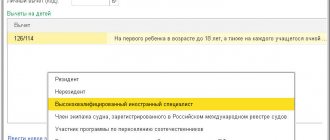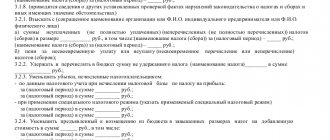Responsibilities of tax agents
The main responsibility of tax agents is to correctly and timely calculate, withhold personal income tax from individuals and transfer tax to the budget (subclause 1, clause 3, article 24, clause 1, article 226 of the Tax Code of the Russian Federation), as well as provide information on the amounts of income paid.
As a general rule, the amount of tax calculated and withheld from employees is subject to transfer to the budget to the tax authority at the place of registration, that is, at the place of registration of the organization (clause 7 of Article 226 of the Tax Code of the Russian Federation).
Although tax agents often commit violations precisely in the order of transferring amounts of withheld tax to the budget.
Let us consider in more detail the features of holding tax agents accountable for this tax violation.
Summary
Arrears are debts formed due to the fact that the enterprise does not make tax deductions, contributions to insurance funds, and the Pension Fund of the Russian Federation. Arrears are discovered during checks and errors in payment documents are discovered by the head of the company himself. Subject to recovery in court. First, the creditor sends a demand for payment to the debtor. If the debtor does not respond to the demands, the creditor has the right to appeal to a judicial authority. Collection occurs through withdrawal of funds from bank accounts and seizure of property.
Late payment
Is it legal in this case to hold him accountable, despite the fact that, in fact, there is no debt (or exists, but in a smaller amount)?
As the Russian Ministry of Finance notes, tax authorities, when holding an organization accountable, act legally. Since the norm of Article 123 of the Tax Code of the Russian Federation provides for liability precisely for the fact that the tax is not withheld or transferred within the established time frame.
That is, a fine is also charged if the tax amount is transferred untimely.
How is arrears identified?
Arrears, in most cases, are identified as follows:
- A tax return is prepared.
- Tax is calculated.
- If the tax is not paid on time, arrears arise.
- The amount of the penalty is formed.
Arrears may be discovered as a result of a tax audit.
Found under the following obligations:
- Incorrect preparation of payment documents, as a result of which the money was not received by the creditor.
- Errors that appeared during calculations.
The owner of the enterprise can find the arrears during the process of checking documents. In this case, he must make the payment immediately.
Circumstances excluding guilt
And, as the Russian Ministry of Finance rightly notes, this article does not provide for such a basis as the subsequent transfer of tax.
Thus, holding a tax agent accountable for even transferring personal income tax at later periods of time is legal.
However, taxpayers must remember one more important point: the statute of limitations for bringing to justice for a tax offense is established by Article 113 of the Tax Code of the Russian Federation, according to which a taxpayer cannot be held accountable if from the day of commission of this offense (or from the next day after the end of the tax period , during which it was committed) and three years passed before the decision to prosecute was made.
Collection procedure
Forcible collection occurs if the debtor refuses to pay them voluntarily.
The creditor himself does not have the right to take coercive measures against the debtor. This is done exclusively through the court.
You cannot go straight to the judiciary. You must first try to solve the problem out of court. To do this, the debtor is first sent a demand for voluntary payment of the debt, which includes the accrued penalty. The requirement is drawn up in the prescribed form. It is sent within 3 months from the date the debt arose. The demand is delivered in person. It can also be sent by registered mail. The document must indicate the following points:
- The time frame within which the arrears must be covered.
- The reasons on which the debt arose.
- The consequences that will be applied to the debtor if he does not pay the debt.
- Information from relevant laws.
The requirement may also not indicate deadlines. In this case, the debtor needs to repay the debt within 10 days.
If the debtor does not make any payments, the creditor has the right to go to court. After receiving the writ of execution, the production process begins. In the process, coercive measures are implemented:
- Write-off of funds from bank accounts in the amount of debt.
- Seizure of property.
- Ban on traveling abroad.
If a debt is not paid for a long time, it is considered uncollectible and is cancelled.
Features of calculating penalties
The penalty is calculated daily. Its size is determined as a percentage of the debt. For example, a person’s debt to the tax office is 1000 rubles. The penalty is set at 0.1%. The delay was 10 days. That is, the penalty will be 10 rubles. The arrears are determined based on the current Central Bank refinancing rate.
Accounting for penalties
How to record a penalty in accounting? There is no need to take into account the penalty in expenses, since it is unreasonable. Postings are used to reflect penalties in documents. To track penalties, you can create auxiliary subaccounts “Peni”. The amount of penalties is indicated in the “Losses” account.
When paying a penalty, two payment orders are issued. The documents are marked with different budget classification codes. These codes include 12 characters.
As it was before
As amended by Article 123 of the Tax Code of the Russian Federation, which was in force before the Federal Law of July 27, 2010 No. 229-FZ (hereinafter referred to as Law No. 229-FZ) came into force, it was stated that a tax agent is held liable for unlawful non-transfer (incomplete transfer) of withheld tax
After Law No. 229-FZ came into force, liability became significantly stricter.
And now the tax agent may be fined for late payment of taxes. Please note that liability for failure to withhold (incomplete withholding) tax amounts applies only if the offense was committed after the specified amendments entered into force (Clause 2 of Article 5 of the Tax Code of the Russian Federation).
During the period of validity of the previous version of Article 123 of the Tax Code of the Russian Federation, tax agents could be exempted from liability for late payment of tax. Provided that the amount of personal income tax was transferred to the budget: 1) before the appointment of an on-site inspection (resolution of the Moscow FAS dated 04/05/11 No. KA-A40/1966-11, North Caucasus dated 02/17/11 No. A32-15885/2010, West Siberian dated 10.02.09 No. F04-643/2009(48-A45-46) districts); 2) before a decision is made based on the results of an on-site audit by the tax authority (resolution of the Federal Antimonopoly Service of the North-Western district dated 01/18/10 No. A44-2439/2009, Ural district dated 01/14/10 No. Ф09-10817/09-С3).
Currently, it is no longer possible to avoid fines for a tax agent who transferred personal income tax in violation of the deadline.
A delay in tax payment of even one day (compared to the established deadlines) allows the tax authorities to impose a fine under Article 123 of the Tax Code of the Russian Federation. And this is 20 percent of the amount of underpayment (late tax paid).
Hello, When requesting an extract from the tax office, we found out that we submitted erroneous data in the 6th personal income tax return. As a result, arrears arose and penalties were charged. In fact, personal income tax is paid in full and on time. What actions should I take?
Guaranteed response within an hour
The legal nature of arrears—the position of the Russian Ministry of Finance
Continuation of the topic started in the article “Overpayment - a fundamental misconception of tax authorities, or a cunning trick?!”
Before diving into the “topic,” I invite readers, each for themselves, to record their position on this issue.
The taxpayer erroneously overstated the amount of tax on his tax return. However, they were paid in a smaller amount in accordance with the actual tax liability. The tax authority, on the basis of the declaration received from the taxpayer, issued a demand to the taxpayer to pay tax in part of the “underpaid” amount.
Question : Does the taxpayer have an obligation to pay the demand?
First, let's evaluate the situation based on the “spirit of the Law.” In other words: “based on the basic provisions and meaning of the legislation on taxes and fees.”
According to paragraph 2 of Art. 11 of the Tax Code of the Russian Federation “arrears - the amount of tax, the amount of collection or the amount of insurance premiums not paid within the period on taxes and fees .”
In accordance with paragraph 1 of Art. 3 of the Tax Code of the Russian Federation “every person must pay LEGALLY ESTABLISHED taxes and fees.” Accordingly, the parameters of a “legally established tax” - first of all, its size and payment deadline - are the most objective factor. And the subjective error of the taxpayer cannot in any way be considered a legal basis for the emergence of a tax liability.
The fact is that the state is not a “white-collar” swindler, profiting from the mistakes of careless and illiterate citizens (and not even “Robin Hood”, lawlessly punishing obvious dodgers and thieves). Tax officials as civil servants in accordance with Art. 15 of the Federal Law of July 27, 2004 No. 79-FZ “On the State Civil Service of the Russian Federation” are obliged to “observe the rights and legitimate interests of citizens and organizations when performing official duties.” According to Art. 32 of the Tax Code of the Russian Federation instructs tax authorities to “comply with the legislation on taxes and fees,” and Art. 33 of the Tax Code of the Russian Federation obliges tax officials to “act in strict accordance with this Code and other federal laws.”
The economic essence of arrears (and let us add, penalties accrued on it) is a quantitative indicator of the material damage caused to the state by the taxpayer as a result of delay in fulfilling tax obligations. The public law method of regulating tax legal relations, enshrined in the Tax Code of the Russian Federation, places on the state the burden of proving the fact of causing material damage, subject to mandatory compliance with the procedures established by the legislation on taxes and fees. Therefore, the situation described in the question is impossible in principle. Let's make a reservation: subject to proper compliance by the tax authorities with the provisions of the legislation on taxes and fees. This is exactly the doctrine that the legislator enshrined in the Tax Code of Russia. Let us confirm this with specific legal norms, based on the authoritative opinion of the authorized government body.
In response to the question about the legal nature of the arrears, the Russian Ministry of Finance in letter dated November 28, 2018 No. 03-02-08/86043 (the letter file is attached to the article) set out absolutely correct conclusions. But, unfortunately, without accompanying them with legal justification. We will try to mitigate this shortcoming without distorting the position of the financial authority.
The whole point is contained in 3 paragraphs. I will quote them verbatim (author's emphasis):
According to paragraph 2 of Art. 11 of the Tax Code of the Russian Federation (Code), an arrear is recognized as an amount of tax not paid within the period by the legislation on taxes and fees . Failure to pay taxes on time is a violation of tax laws. If the arrears are identified outside of a tax audit , the demand for tax payment is sent by the tax authority in accordance with clause 1 of Art. 70 Code. The fact of the existence of arrears is reflected in the document, the form of which was approved by order of the Federal Tax Service of Russia dated February 13, 2017 No. ММВ-7-8/ [email protected]
Please note: the position of the Russian Ministry of Finance is “tied” to a very important provision of clause 2 of Art. 69 of the Tax Code of the Russian Federation: “The requirement to pay tax is sent to the taxpayer if he has
Applying the rules of logic to the quoted fragment of the letter in question from the Russian Ministry of Finance, we will inevitably come to the following two conclusions.
- Firstly, from the first two paragraphs (premises), the conclusion follows “reinforced concrete”: arrears are a violation of the legislation on taxes and fees .
- Secondly, according to the third paragraph, documentation of the “fact of arrears” (formation of an evidence base by the tax authority) is carried out in one of two alternative ways:
Method 1 – identifying arrears “outside of a tax audit.” To confirm this, a document is drawn up in the form approved. by order of the Federal Tax Service of Russia dated February 13, 2021 No. ММВ-7-8/ [email protected]
Method 2 – identifying arrears during a tax audit.
Let's start with a method that is relevant for entrepreneurs to establish the fact of “the presence of arrears” during tax audits. Taking into account the fact that the desk tax audit procedure, as well as how modern information technologies introduced by the Federal Tax Service of Russia into tax control ensure the protection of the rights and legitimate interests of taxpayers, will be discussed in one of the following articles. Here we will focus only on the key points related to the topic of the article. So, the most important thing.
1. In accordance with paragraph 2 of Art. 88 of the Tax Code of the Russian Federation, for each tax declaration (tax report) received by the tax authority, a desk tax audit is mandatory.
And only if the declaration is not received within the required time frame, the tax authority has the right to begin a desk tax audit (in the absence of a declaration) based on the information available to the tax authority about the taxpayer and his taxable income. However, after the receipt (late) of a tax return, a desk tax audit must begin (paragraph 3, paragraph 2, article 88 of the Tax Code of the Russian Federation).
2. According to paragraph 5 of Art. 88 of the Tax Code of the Russian Federation “if, after considering the submitted explanations and documents, or in the absence of explanations from the taxpayer, the tax authority establishes the fact of committing a tax offense or other violation of the legislation on taxes and fees , officials of the tax authority are obliged to draw up an inspection report in the manner prescribed by Article 100 of this Code.”
Thus, failure to draw up an act upon completion of a desk tax audit means the absence of violations of the legislation on taxes and fees (and not just tax offenses). Let us remind you that arrears, according to the official explanation of the financial authority, are precisely a violation of the legislation on taxes and fees.
3. Tax audit materials (the main one of which is the Audit Report) in the manner established by Art. 101 of the Tax Code of the Russian Federation are considered by the head (his deputy) of the territorial tax authority, who can make two types of Decisions:
- when establishing the fact of a tax offense - on bringing to tax liability;
- in the absence of a fact or corpus delicti of a tax offense - a refusal to bring to tax liability.
And then a very important detail: in any outcome of the case, if the fact of arrears is established (including those already paid by the taxpayer), the Decision must indicate the specific amount of this arrears and (or) accrued penalties (paragraphs 1 and 2 of clause 8 of Art. 101 of the Tax Code of the Russian Federation).
The decision in accordance with paragraph 9 of Art. 101 of the Tax Code of the Russian Federation comes into force one month after delivery to the taxpayer (and in the case of an appeal, immediately after consideration of the appeal by a higher tax authority).
Thus, only after the Decision has entered into force based on the results of consideration of the tax audit materials, the fact of the existence of arrears is considered established. And accordingly, the tax authority receives the right to begin the procedure for claiming it.
4. According to paragraph 2 of Art. 70 of the Tax Code of the Russian Federation “the requirement to pay tax based on the results of a tax audit must be sent to the taxpayer (...) within 20 days from the date of entry into force of the relevant decision, unless otherwise provided by this Code.” “ Other ” is not provided for by the Tax Code of the Russian Federation. Moreover, this rule is duplicated (and without any “ifs”) in paragraph 3 of Art. 101.3 of the Tax Code of the Russian Federation: “ On the basis of a decision that has entered into force, the person in respect of whom the decision was made <...> is sent , in accordance with the procedure established by Article 69 of this Code, a requirement to pay a tax (fee, insurance contributions) and the corresponding penalties.”
The point of view presented here is confirmed by the position of the Ministry of Finance, set out in letter dated 06/11/2019 No. 03-15-05/42607 (the letter is attached to the article). Although the main topic of the letter is individual issues of regulatory regulation of control over the payment of insurance premiums (including transitional provisions in connection with the transfer of administration from the Pension Fund of the Russian Federation to the Federal Tax Service of Russia from 01.01.2017), the penultimate three paragraphs of the letter are devoted to the procedure for sending a request for payment of tax based on tax results checks. I will quote them in full (author's emphasis):
The subject of tax control is the correctness of calculation and timely payment of taxes, fees, and insurance premiums specified in Article 8 of the Code.
The procedure for conducting tax audits, consideration of materials based on the results of their conduct, and decisions by tax authorities based on the results of consideration of materials of tax audits are regulated by Articles 88, 89, 100, 101 of the Code.
The requirement to pay taxes , fees, insurance premiums, penalties, fines based on the results of a tax audit is sent in accordance with Articles 69, 70 and paragraph 3 of Article 101.3 of the Code.
The attentive reader, I hope, noticed that the legislator operates with similar (close in meaning) categories “tax offense” and “violation of legislation on taxes and fees.” Their relationship is revealed in this example.
In accordance with paragraph 1 of Art. 122 of the Tax Code of the Russian Federation, failure to pay taxes within the due period is a tax offense (Article 106 of the Tax Code of the Russian Federation), for which a financial sanction is imposed. Arrears in this case is one of the elements of a tax offense. If the full composition of the tax offense is not confirmed, then the arrears discovered during the tax audit are qualified as a violation of the legislation on taxes and fees. In both cases, the procedure for claiming arrears is initiated in the manner established by clause 3 of Art. 101.3 of the Tax Code of the Russian Federation (in the first case, together with the imposed financial sanction - a fine). Thus, a tax offense is a special case of a broader concept - violation of legislation on taxes and fees.
It is impossible not to mention that the fact of arrears can also be confirmed by the Act of Mutual Reconciliation of Settlements. In this case, the taxpayer voluntarily acknowledges the existence of arrears, relieving the tax authority from the need to carry out the procedures established by the legislation on taxes and fees.
Let's return to the case of establishing the existence of arrears outside of a tax audit.
Based on the fact that every declaration received by the tax authority is subject to a desk tax audit, the scope of application of such a “one-sided” (and therefore obviously subjective) method is limited to cases of tax control of undeclared taxable items. And this is overwhelmingly the sphere of relations with citizens who are not entrepreneurs. For example, property taxes on individuals. And there is a logical explanation for this. In such cases, the tax authority independently keeps records of both tax accruals (notifying taxpayers about them) and payments received to repay them. This allows tax authorities to single-handedly establish the existence of arrears by issuing the appropriate document.
The legality of using such a “unilateral” (without the participation of the taxpayer) method of establishing the fact of “arrears” in the course of other tax control activities is very doubtful. If only because the Law does not directly stipulate such cases. And taxpayers, guided by Art. 21 of the Tax Code of the Russian Federation, “have the right <...> to demand that officials of tax authorities and other authorized bodies comply with the legislation on taxes and fees when they carry out actions in relation to taxpayers.”
I hope the above arguments will help taxpayers in protecting their rights and legitimate interests.
Start of the topic: Overpayment: a fundamental misconception of tax authorities, or a cunning trick?!
Continuation of the topic: Reconciliation with the tax office: “pitfalls” and “ambushes”
Accrued arrears on insurance premiums posting
However, this in no way affects the accounting and postings that are compiled in the organization, and, therefore, the correspondence and rules for calculating contributions remain the same. New card for recording insurance premiums Interest rates When calculating insurance premiums, the following interest rates are taken into account:
- for pension insurance - within the limit of 22%, above the limit of 10%;
- for health insurance - 5.1%;
- for social insurance - within the limit of 2.9%, above the limit 0%;
- for accident insurance - from 0.2 to 8.5%; For disabled people, only 60% of the calculated insurance premiums is taken.
All calculated insurance premiums are reflected in account 69, only broken down by subaccounts. In addition, analytical records are also maintained for each employee individually.
Arrears on insurance premiums accounting
Account 91 is debited if the reporting for the year in which taxes have not been accrued has already been signed. Personal income tax has not been calculated D 73 (76) - K 68 Additional personal income tax has been accrued, which can be withheld from the income of an individual. If additional tax is assessed on payments in favor of: - employees - account 73 is debited; D 70 (76) - K 73 (76) Additional personal income tax is withheld from payments in favor of the individual. Insurance premiums are not accrued. D 20 (26, 44, 91) - K 69. Additional insurance premiums are accrued. The transfer of debt does not exempt the company from penalties for missing the period established by law. The amount of sanctions is calculated as a percentage of the amount of contributions payable. This figure is equal to 1/300 of the refinancing rate of the Central Bank of Russia in effect on the date of delay. From January 1, 2021, it is equal to 11%.
Accounting entries for arrears of insurance premiums
Corresponding sub-accounts can be opened for the account, characterizing the type of insurance contributions, including those related to pension, medical or social insurance. Accounts The credit of the account shows the debt of the business entity for transfers of insurance premiums, and the debit shows the amounts that the company transfers to the state budget.
- In this case, a credit balance is usually formed on the account, which shows how much insurance premiums the organization is obliged to transfer.
- There is also a debit balance when the company has transferred an excess amount of contributions or government agencies have a debt to the company.
The latter situation is especially common when interacting with the Social Insurance Fund, when the calculated amount of contributions is less than the benefits paid to employees.
When can tax arrears be written off?
Current legislation provides for situations in which tax arrears may be written off. In this case, the debtor will still be considered to have a debt, but it may become uncollectible and, accordingly, no additional sanctions or restrictions will be applied to the debtor for its existence. In particular, tax arrears are considered uncollectible if the debtor:
- It is a liquidated organization.
- He was declared bankrupt in accordance with the procedure established by law.
- He was an individual and died.
- He received a court decision according to which the arrears could not be collected from him.
- He turned to the bailiffs with a request to close the proceedings on the basis that the amount of arrears was insufficient to begin bankruptcy proceedings or if the court refused to recognize bankruptcy due to lack of funds to pay legal costs.
Accrued arrears on insurance premiums posting
How are penalties collected and what will happen for late payment? Often, the policyholder ignores the notice of payment of debts. If a notice of the need to pay a fine was delivered to the enterprise, but the payment was not made, the amount is collected forcibly:
- a collection order is sent to the banking institution where the payer’s current account is opened (funds will be debited as they are received until the debt is repaid);
- bailiffs receive a ruling on the need to collect debt by seizing the payer’s assets and selling them;
- if the debt is registered with an individual (not an individual entrepreneur), a lawsuit will be filed against him in order to withhold funds from his assets, after which a bailiff will be involved in seizing the debt.
When insurance contributions are not made on time, the pension rights of insured citizens are violated.
When fines, penalties, penalties for receipt or payment are accrued, the moment of their reflection in accounting and tax accounting coincides. . . 1. Reasons for the occurrence of arrears in insurance contributions to the Pension Fund According to Law No. 212-FZ, the obligation is considered fulfilled:
- from the moment a transaction related to the transfer of money to the relevant authorities is reflected in the enterprise’s account;
- from the date of presentation to the bank of a properly executed payment order;
- from the date of the supervisory authority’s decision to set off previously overpaid amounts;
- from the moment of depositing cash into the bank's cash desk, the administration to repay the debt to the relevant fund.
That is, if an organization transfers money for March 2021 on April 18, the accounting service should send to extra-budgetary funds an amount equal to mandatory contributions increased by the amount of the penalty.
Arrears on insurance contributions to the Pension Fund, Social Insurance Fund, Federal Compulsory Medical Insurance Fund: calculation of penalties." Posting penalties to the Pension Fund of the Russian Federation (to the Federal Tax Service): when to make the posting The day on which transactions to accrue the amount of penalties should be reflected is selected depending on whether the accountant paid the penalties himself or whether the obligation to pay them was discovered after an audit:
- when the accountant himself corrected the error and paid the penalty, the transactions are posted on the day of their calculation (and the day must be indicated in the calculation certificate);
- if a notice was received to remind you to pay penalties, the accountant makes an entry for the day when the decision to accrue them after the audit came into force.
Legislative acts on the topic It is recommended to study in advance: Document Title Federal Law of July 24, 1998 No. 125-FZ “On Compulsory Social Insurance” Norms for insurance premiums in cases of injury p.
Basics of accounting for insurance premiums and posting them
Peculiarities of reflecting tax penalties in accounting To display penalties in accounting, you can use two accounts - 91 or 99. To display accrued penalties, it is recommended to use account 99, which allows you to avoid a permanent tax liability, since when generating an income tax return, the accrued penalty for insurance contributions are not included in the calculation of the tax base. It is recommended to consolidate the use of account 99 in the accounting policy of the enterprise. List of possible entries for accrual of penalties for income taxes, VAT, personal income tax and insurance contributions Account Dt Account Kt Posting amount, rub.
What is arrears?
Tax debt or arrears are the obligations of a business entity or individual that:
- were not executed in a timely manner;
- were excessively reimbursed by decision of the Federal Tax Service (for example, excise taxes, VAT amounts).
Arrears are the amount of tax or fee on which penalties are charged for each day of delay. This is a kind of compensation charged by the budget for delay. If a business entity does not pay its obligations on time, the amounts will be forcibly collected.







